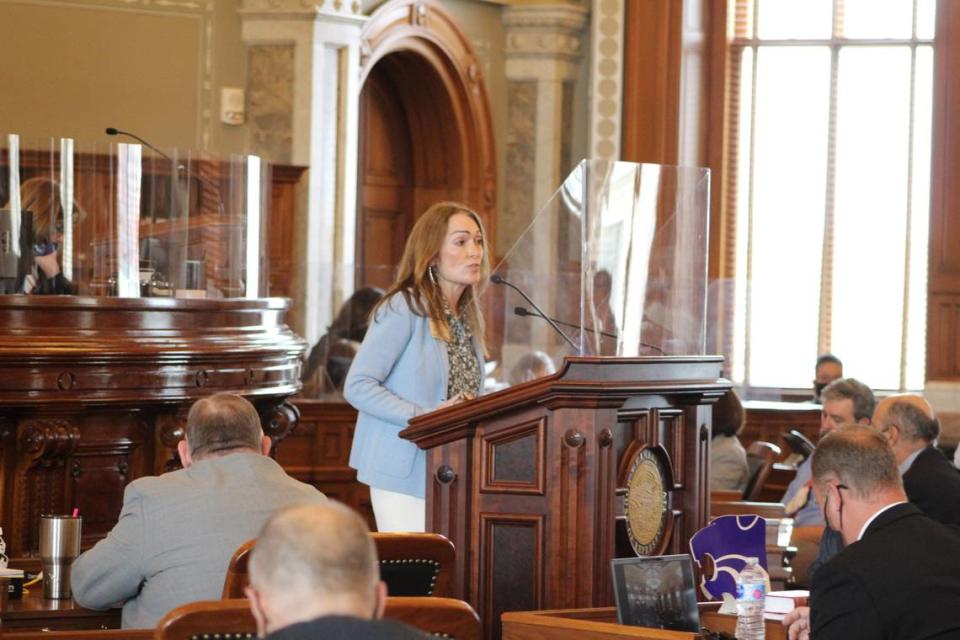Controversial Kansas education plan fails as GOP lawmaker switches vote last minute
After a dramatic late-night stalemate, the Kansas Senate on Friday rejected a major overhaul of education policy that would have tied $5.8 billion in school funding to some controversial measures to expand school choice and restrict online learning.
The House had narrowly passed the policy, but the Senate failed to do the same, on a 20-20 vote.
The night before, the measure failed to pass as well, as the Senate was split 20-18 — one vote short of passage. So proponents used a procedural move to push the vote to Friday.
The move allowed Senate Majority Leader Gene Suellentrop, who had left the statehouse after the release of damaging records in his felony case, to drive back to Topeka and cast a potentially decisive vote.
Instead, the measure failed as Sen. Rob Olson, an Olathe Republican, changed his vote Friday afternoon, joining eight other Republicans opposing the bill.
Senate President Ty Masterson, an Andover Republican, dismissed his vote as “political games.”
Olson rejected that claim Friday afternoon, saying he had simply taken a second look at the bill.
“I guess if everybody doesn’t do what (Masterson) wants to do they’re playing political games,” Olson said.
Mark Tallman, a lobbyist for the Kansas Association of School Boards, said it was evidence that the bill needed more work.
“There were a lot of senators, including some who are more conservative members, who obviously did still have some second thoughts about it,” Tallman said. “Whatever we do going forward, the goal would be, again, to try to find something that meets the concerns of everybody without, in our view, creating some possible long-term damages to our system.”
The package would have tied funding to measures that have been criticized by the state school board association and Kansas National Education Association. Opponents say the programs would divert public funds to private education while limiting options for districts contemplating innovations involving remote learning.
The bill would have expanded eligibility for a tax credit scholarship program aimed at allowing low income students to attend private schools. It also would have created a new program allowing any at risk student to take the money the state would spend on their public education and move it into an “education savings account.” Those accounts could then be used to fund private school, tutoring or other approved educational expenses.
At risk students include those performing below grade level, with dyslexia or high absenteeism among other qualifications.
“This sends a clear message to Republican leadership that the final budget must fully fund K-12 education, and I look forward to working with them to ensure that we do not go back to the courts and harm our students in the process,” Senate Minority Leader Dinah Sykes, D-Lenexa, said in a statement.

Now that the package has been rejected, Sen. Molly Baumgardner, a Louisburg Republican and chair of the Senate education committee, said full funding of education could be placed in the broader budget bill while some portions of policy could be addressed when the Legislature comes back in May.
She said she hoped to focus on policies, such as funding for at-risk students.
“I will be talking to members to find out what things do you want, what things can you live with,” Baumgardner said.
The proposal to create education savings accounts, Baumgardner said, may be left out of the picture this year.
“It may be, quite frankly, that the ask is that the House needs to address it again next year,” she said.
But Rep. Kristey Williams, an Augusta Republican and driving force behind the bill, said she would not support approving funding for K-12 schools without tying policy to it.
“When you don’t come to the table and you don’t try to address at risk kids and you just leave them to fail, that doesn’t speak highly of the ones who voted against it,” she said. “They are doing nothing to address at risk kids.”
Several House and Senate Republicans who voted against the bill cited concerns over harming public schools and the potential of lawsuits over school funding.
Sen. Brenda Dietrich, a Topeka Republican, added that the school choice measures would only apply to students in urban areas with many private schools.
“If you’re in western Kansas, this money is not going to follow you that direction unless you decide to create your own private or public school,” Dietrich said in debate Thursday. “We absolutely must take very good care of our kids and do our very best to meet their needs, and we can always do better.”
But proponents said something new was needed to improve Kansas schools.
“Doing the same thing has not produced better results. At what point do you free the children and give the children their lives back?” said Rep. Brenda Landwehr, a Wichita Republican.
Baumgardner had said earlier in the week that the legislation would push schools to do the work to identify and provide specific services to at risk students.
“It is a very real call to action for our public schools, you’d better start getting serious about kids that are at risk,” Baumgardner said. “What you’re starting to see is that ‘bubble up’ frustration that they’re not being applied directly they’re not receiving those services and programs that help them get up and out of being in that category of at risk.”
Additionally, the bill would have reduced funding to districts for every student participating in remote learning beyond a specified number of hours each school year. Under states of emergency, the amount of time would be extended and school districts could apply for additional time.
Some Kansas school districts, including Olathe and Blue Valley, have already been planning to offer online-only learning next year for families requesting it.

